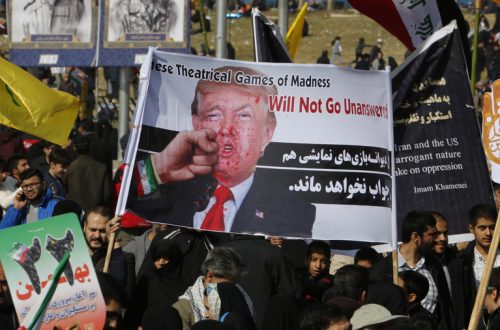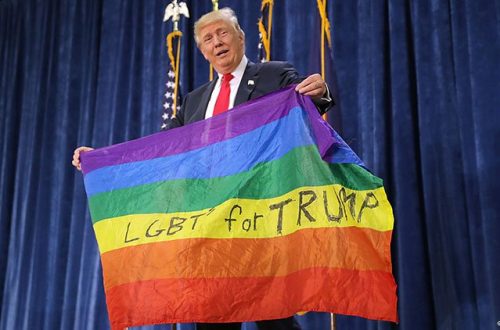Anne Applebaum, one of the leading historians of the horrors of Soviet Communism, writes on the 100th anniversary of the “Great October Revolution” (which, she notes, was not great, was not in October and was not a revolution):
History repeats itself and so do ideas, but never in exactly the same way. Bolshevik thinking in 2017 does not sound exactly the way it sounded in 1917. There are, it is true, still a few Marxists around. In Spain and Greece they have formed powerful political parties, though in Spain they have yet to win power and in Greece they have been forced by the realities of international markets, to quietly drop their “revolutionary” agenda. The current leader of the British Labour Party, Jeremy Corbyn, also comes out of the old pro-Soviet far left. He has voiced anti-American, anti-NATO, anti-Israel, and even anti-British (and pro-IRA) sentiments for decades — predictable views that no longer sound shocking to a generation that cannot remember who sponsored them in the past. Within his party there is a core of radicals who speak of overthrowing capitalism and bringing back nationalization.
In the United States, the Marxist left has also consolidated on the fringes of the Democratic Party — and sometimes not even on the fringes — as well as on campuses, where it polices the speech of its members, fights to prevent students from hearing opposing viewpoints, and teaches a dark, negative version of American history, one calculated to create doubts about democracy and to cast shadows on all political debate. The followers of this new alt-left spurn basic patriotism and support America’s opponents, whether in Russia or the Middle East. As in Britain, they don’t remember the antecedents of their ideas and they don’t make a connection between their language and the words used by fanatics of a different era.
But so far, the new left, however fashionable it may be in some circles, is not in power, and thus has not managed to create a real revolution. In truth, the most influential contemporary Bolsheviks — the people who began, like Lenin and Trotsky, on the extremist fringes of political life and who are now in positions of power and real influence in several Western countries — come from a different political tradition altogether.
Donald Trump, Viktor Orban, Nigel Farage, Marine Le Pen and Jaroslaw Kaczynski: although they are often described as “far-right” or “alt-right,” these neo-Bolsheviks have little to do with the right that has been part of Western politics since World War II, and they have no connection to existing conservative parties. In continental Europe, they scorn Christian Democracy, which had its political base in the church and sought to bring morality back to politics after the nightmare of the Second World War. Nor do they have anything to do with Anglo-Saxon conservatism, which promoted free markets, free speech and a Burkean small-c conservatism: skepticism of “progress,” suspicion of radicalism in all its forms, and a belief in the importance of conserving institutions and values. Whether German or Dutch Christian Democrats, British Tories, American Republicans, East European ex-dissidents or French Gaullists, post-war Western conservatives have all been dedicated to representative democracy, religious tolerance, economic integration and the Western alliance.
By contrast, the neo-Bolsheviks of the new right or alt-right do not want to conserve or to preserve what exists. They are not Burkeans but radicals who want to overthrow existing institutions. Instead of the false and misleading vision of the future offered by Lenin and Trotsky, they offer a false and misleading vision of the past. They conjure up worlds made up of ethnically or racially pure nations, old-fashioned factories, traditional male-female hierarchies and impenetrable borders. Their enemies are homosexuals, racial and religious minorities, advocates of human rights, the media, and the courts. They are often not real Christians but rather cynics who use “Christianity” as a tribal identifier, a way of distinguishing themselves from their enemies: they are “Christians” fighting against “Muslims” — or against “liberals” if there are no “Muslims” available.
To an extraordinary degree, they have adopted Lenin’s refusal to compromise, his anti-democratic elevation of some social groups over others and his hateful attacks on his “illegitimate” opponents. Law and Justice, the illiberal nationalist ruling party in Poland, has sorted its compatriots into “true Poles” and “Poles of the worst sort.” Trump speaks of “real” Americans, as opposed to the “elite.” Stephen Miller, a Trump acolyte and speechwriter, recently used the word “cosmopolitan,” an old Stalinist moniker for Jews (the full term was “rootless cosmopolitan”), to describe a reporter asking him tough questions. “Real” Americans are worth talking to; “cosmopolitans” need to be eliminated from public life.
And no one should be surprised that Trump’s former strategist and current Breitbart News chairman media cheerleader Steve Bannon once called himself a Leninist. Lenin, he said, “wanted to destroy the state, and that’s my goal too. I want to bring everything crashing down, and destroy all of today’s establishment.”
What all neo-Bolsheviks have in common is a sneering contempt for old-fashioned liberal democracy at home or abroad.


